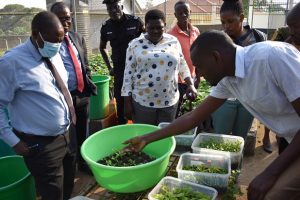The KR varieties grow faster and are high yielding
The National Coffee Research Institute (NaCORI) is developing drought resistant and more high yielding varieties of coffee in a move to cushion farmers against the adverse effects of climate change/drought.
In an exclusive interview with Business Focus, NaCORI Director, Dr. Geoffrey Arinaitwe, said NaCORI developed wilt resistant varieties following the outbreak of coffee wilt disease in 1990s that wiped out over 50% of the Robusta coffee tree population in the country.
The research institute has since developed and released 10 Robusta Coffee Wilt Disease-resistant (CWDr) varieties named KRs (Kituza Robusta varieties). The 10 varieties are named KR1 to KR 10. NaCORI is located in Kituza, Mukono district.
The KR varieties are not only resistant to coffee wilt disease, but also tolerant to leaf rust, produce large beans and have higher yield compared to the traditional coffee trees. According to Dr. Arinaitwe, farmers can get a mean yield of 3,700kg (hulled coffee) per hectare per year.
Dr. Arinaitwe says the KR varieties are not very tolerant to drought because they were selected based on resistance against the disease (coffee wilt).
“We have about three lines that are fairly tolerant,” he says.

“We did not evaluate them (KR varieties) for drought tolerance but currently we have a program of developing resistant coffee materials particularly for mid North,” Dr. Arinaitwe adds.
Northern Uganda, traditionally not known as a coffee growing region has embraced the cash crop.
Dr. Arinaitwe, the NaCORI boss, says through research, they are ready to support coffee farmers in the region with drought resistant varieties so that they benefit from coffee production and coffee sales.
“In the short term, we are looking at grafting the current coffee varieties that are susceptible to drought on to a wild coffee called Kisansa or Coffea liberica that has robust root network and if we grafted KR1 up to 10 on to Kisansa root stalk, we believe we’ll have coffee that is tolerant to drought to even grow in the northern part of the country,” Dr. Arinaitwe said.
He adds that NaCORI is collecting wild coffee from forests like the Zoka forest in Adjumani that are tolerant to drought.
“We are going to integrate those resistant materials because although the wild coffee in Zoka has very small cherries, it is resistant to drought. We will combine them with the current ones such that we get varieties that are resistant to drought and produce bigger beans,” he says
“This is likely to take around 10 to 15 years. That’s why in the short run we feel we can use grafted coffee plants and they will grow well. They will take us through these years as we develop for the long term goal.”
Four High Yielding Varieties in Pipeline
Dr. Arinaitwe further explains that more high yielding varieties are in the pipeline.
“We have around four (4) new Robusta varieties that will come in the next three years. They are KR 11, 12, 13 and 14,” he says.
He says the institute has not released new Arabica coffee varieties for the last 39 years.
He says right now research is ongoing and new improved varieties will be released.
“We have five potential varieties of Arabica coffee,” he says, adding that the research takes into account the cup quality.
“Compared to the current Arabica coffee varieties we have on the market, and these five varieties of Arabica coffee, we have one ingredient that is very attractive. They are short and the canopy is smaller. That means the young children going to school and our mothers, the female community will cherish this variety. They are easy to harvest, the beans are much bigger and the cup quality is okay and the yield is better than the current A SL 14 and 32,” Dr. Arinaitwe explains.
He adds that in the next two years, they hope to change the profile of Arabica coffee on the market as government thinks this can support the strategy of doubling the production and export of Arabica coffee from Uganda.
UCDA is on the road towards achieving a target of 20 million bags of coffee by 2030.
Robusta is the major type of coffee grown in Uganda, accounting for about 80% of production. Arabica only accounts for 20%.
Uganda’s coffee exports for 12 months (Financial year 2021/22) totaled 6.26 million bags worth US$ 862.28 million compared to 6.08 million bags worth US$ 559.16 million the previous year (Financial year 2020/21).
NaCORI is one of the 16 Public Agricultural Research Institutes under the umbrella of the National Agricultural Research Organisation (NARO). NaCORI’s mandate is to conduct and manage basic and applied research of strategic nature and national importance in all fields pertaining to coffee and cocoa. NaCORI came into existence in 2014 in response to the National Coffee Policy (2013).
For genuine and quality Clonal Coffee Planting materials, contact Pearl Model Farm via: 0775170346 (WhatsApp)/0703828741/staddewo@gmail.com





